LATE MODEL ANSONS IN AUSTRALIA
The Royal Australian Air Force operated a total of 1,028 Avro Anson Mk.1s shipped from Britain between 1936 and 1944. These Anson Mk.1s were of metal frame construction with wood and fabric covering mounted on a singe-piece wooden mainplane. After World War II, large numbers were sold by military disposals for post-war civilian use and 145 received Australian civil registrations.
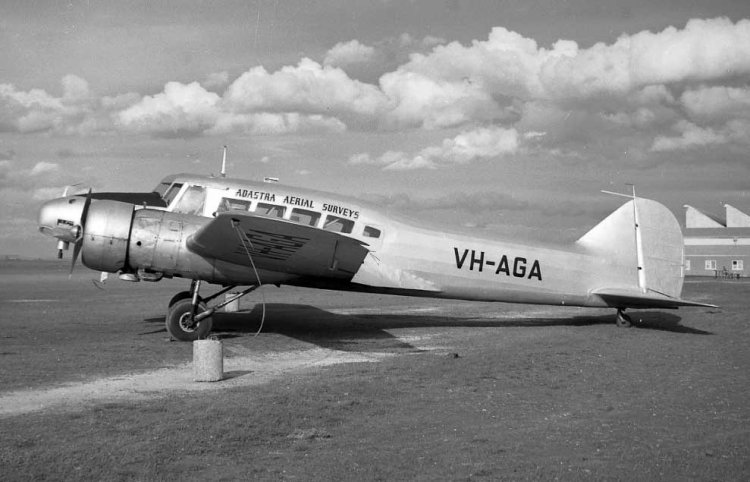
Typical civilianised former RAAF Anson Mk.1, Adasyra Aerial Surveys' VH-AGA at Essendon May 1962. Photo by Geoff Goodall
From
1944 Avro commenced production of a new range of RAF models of Anson,
all featuring enlarged cabins with higher headroom, with
more powerful models of Armstrong Siddeley Cheetah
engines. Three Anson C.XIIs were used in Australia from 1945 as VIP transports.
In
1945 Avro modified an RAF Anson 12 to take 9 passenger seats in the cabin
fitted with five oval windows. This satisfied the Brabazon Committee’s
XIX feeder liner specification for post-war airliners and went into civil
production as the Avro Nineteen. In 1946 a refined design
with metal construction tapered wings of wider span was designated Avro
19 Series II. This metal wing version was also sold to the
RAF in large numbers as the Anson C.19 Series II, and later military trainers
Anson T.20, T.21 and T.22.
Two new RAF Anson C.19 Series II were shipped to Australia in 1947 to support the British developments at the Woomera Rocket Range in South Australia.
On 30 June 1962 the Department of Civil Aviation grounded all Australian civil Anson Mk.1s because of airworthiness concerns relating to poor single engine performance, and structural integrity of their glued joints in the wooden wings amd tailplanes. The later metal wing Ansons were not included in the DCA grounding order, resulting in a civil Avro 19 Series II VH-RCC being delivered from England to a Melbourne charter company in 1962. Brain and Brown Airfreighters of Melbourne rebuilt an Anson Mk.1 VH-BAF with a metal C.19 mainplane and tailplane and many other improvements, which flew in May 1963. Despite early hopes that orders would follow from other operators to carry out similar conversions to their grounded Mk.1 airframes, no further conversions were carried out.
One example of the moulded plywood construction Canadian Anson Mk.5 visited Australia 1957-59 while conducting mineral survey operations in remote parts SA and WA in the search for radium and other metals. As a wartime contingency this Canadian design was built from Vidal moulded plywood to reduce the need for steel fuselage frame. The mostly wooden construction made Canadian military disposals Anson 5s popular for electro-magnetic mineral survey.
The following aircraft are covered in this paper:
| Anson C.XII | NL153 | Governor General’s Flight, Canberra | to VH-PDC, VH-GVB |
| Anson C.XII | PH599 | RAF Australia | to NZ |
| Anson C.XII | PH 600 | RAF Australia | to NZ |
| Anson C.19 | VM374 | Woomera courier | crashed |
| Anson C.19 | VM375 | Woomera courier | to VH-BIX |
| Avro Nineteen | VH-RCC | Nicholas Air Charter | |
| Avro 652AM (Modified) | VH-BAF | Anson Mk.1 fitted with Anson C19 metal wing, tailplane and engines | to NZ |
| Anson Mk.V | CF-HOT | mineral survey SA & WA 1957-1959 | returned to Canada |
1)
AVRO C.XII NL153 of the Governor General’s Flight, Canberra
The Governor General’s Communications Flight was established as a RAAF unit in early 1945 after the announcement that HRH Prince William of Gloucester would be the next Australian Governor General. Other aircraft assigned to the Flight: Avro York MV140, Percival Proctor NP336 and Anson 1 AW879. The Flight was disbanded in May 1947 at the end of the Prince William’s Australian term.
Looking back it can be seen as an overzealous reaction to royalty – the travel needs of subsequent Governors General over the next ten years were satisfied by a RAAF Dakota being made available when needed. Later No.34 Squadron’s VIP Flight was formed with Convair 440s, then Viscounts, before the jet era.
AVRO C.XII, to civil ANSON 12 NL153, VH-PDC, VH-GVB
| .44 | Built by A.V.Roe and Co Ltd at Yeadon Aerodrome,
Leeds as an Anson C.XII. Two 420hp Armstrong Siddeley Armstrong Siddeley Cheetah 15 engines |
| Built to Air Ministry contract for a total of 800 Avro Ansons of various models for RAF in serial range NK139 to NL251. | |
| Taken on RAF charge as Anson C.XII NL153 | |
| Completed by Avro as the prototype Mk.XII Ambulance, with wing root fillets on the port side to allow stretchers to be pushed into the cabin. Three large square windows | |
| 27.10.44 | First test flight Yeadon |
| No allocation to RAF unit. Designated | |
| Modified as prototype MK.XII VIP Transport. Five smaller rounded cabin windows | |
| Shipped to Australia for use by the Governor General’s Communications Flight, formed to provide transport needs for the Duke of Gloucester who had been appointed Australian Governor General. | |
| Luxurious fittings included specially made brown plush sleeper chairs, deep pile brown carpeting in the cabin, special air conditioning and noise insulation. | |
| 30.1.45 | Received by RAAF as Anson C.XII NL153. Received 2AD Richmond ex UK |
| 26.2.45 | Received Station HQ Canberra for use by Governor General’s Communications Flight |
| 20.3.45 | Damaged on landing Canberra when starboard undercarriage collapsed.
No injuries to pilot F/Lt E. J. Meredith and four passengers including
HRH Duke of Gloucester. Repairable within unit |
| 5.47 | Governor General’s Communications Flight disbanded |
| 2.6.47 | Received Station HQ Canberra ex Governor General’s Flight |
| 11.8.47 | Received 4 Squadron ex SHQ Canberra, for VIP duties |
| 28.1.48 | To be brought on charge as RAAF property |
| 22.3.49 | Damaged landing at Casino NSW. Undercarriage collapsed when aircraft swung violently in gusty winds and ground-looped. Came to rest on its belly. F/Lt D.R.Buchan and two passengers were unhurt. |
| 2.9.49 | Received Airflite Pty Ltd, Bankstown for servicing and repair. |
| 7.8.50 | Received 2AD Richmond ex Airflite |
| 15.9.50 | Received Central Flying School, East Sale ex 2AD |
| 17.12.51 | Received 1AD Detachment B Tocumwal ex CFS for storage under cover |
| 4.4.52 | Anson 12 (Cheetah XVs) plus spares held at East Sale recommended for disposal |
| 8.7.52 | Action to be taken to proceed with disposal on Air List No.7193 |
| 7.1.53 | The Advertiser newspaper, Adelaide
reported that the Avro Anson formerly used by the Duke of Gloucester
will be flown in the London to Wellington Air Race this October by
an all-woman Australian crew: Mrs Gertrude McKenzie, Miss Freda Thompson,
Miss Constance Jordon and Mrs. Evelyn Karen. “We went to see Mrs. R.G.Casey, wife of the Minister for External Affairs”, Mrs McKenzie said. “She is patron of the Australian Women Pilots Association, and through her husband we managed to get the plane. We are being charged a nominal figure for the plane, but it is quite reasonable. Our Avro has a cruising speed of 100 miles per hour.” They intended to fly the Anson to England to commence the race. |
| Sale to Gertie McKenzie’s air race crew not completed. The compiler suggests a contributing factor would have been the cost and delay associated Department of Civil Aviation first-of-type civil certification. This Anson 12 was not covered under the existing wooden-wing Anson Mk.1 type certificate. |
|
| 23.2.53 | Sold for £3000 to Kingsford Smith Flying Service, Sydney NSW |
| 22.4.53 | Held in under cover storage at RAAF Tocumwal |
| 20.8.54 | Added to Register as Anson 12 VH-PDC Max W. Hopp, Brisbane Qld |
| Max Hopp was a freelance commercial pilot based in Brisbane who
has been associated with several Ansons. He enlisted in AIF in 1941 and served in New Guineas with Australian Army 1943-45. His service record quotes him as a builder, and records a series of discipline charges and small fines. His post-war businesses included builder and used car dealer. A September 1953 newspaper report on Queensland pilots quotes: “Max Hopp, a 38 year old Brisbane businessman with mining interests at Armidale NSW flies himself in a snappy Czechoslovakian Sokol light plane. He is looking around for a second plane.” Earlier in August 1954 he flew his own Mraz Sokol VH-AXY in the Redex Air Trial from Sydney to Brisbane, Darwin, Adelaide back to Sydney, accompanied by TAA captain H.A.Collings. Hopp reportedly waxed and polished the aircraft’s surface to improve its performance. |
|
| 8.54 | Newspaper reports that Petroleum Drilling Corporation Ltd has purchased the Avro Anson previously used by the Governor General. It will enter service later in August when an airstrip has been completed at Reid’s Dome drilling site near Springsure Qld. The Anson will carry oil company executives and has retained the luxury fittings installed for the Duke and Duchess of Gloucester. |
| Petroleum Drilling Corporation Ltd began operations in June 1954 and the company was listed on the Sydney Stock Exchange that month. It was contracted to perform drilling in Australia for US oil companies. The company was drilling near Gladstone Qld in December 1954. | |
| Whether VH-PDC actually flew for Petroleum Drilling Corporation
is not known. Shortly after it was registered, it was sold to Goulburn
Valley Air Services, Melbourne. Petroleum Drilling Corporation registered Anson Mk.1 VH-BKU on 29.9.54. This was ex RAAF W2084, one of a number held in storage at Camden since 1947 owned by the Jas Loneragan/Eric McIllree syndicate which marketed disposals Ansons. |
|
| 19.11.54 | Change of ownership: Sir Reginald J. Barnewall, trading as Goulburn Valley Air Services, Melbourne Vic |
| 19.11.54 | Change of registration to VH-GVB |
| Based at Essendon Airport, Melbourne. Painted silver and white with blue trim, with titles “Goulburn Valley Air Services” above the windows. Name Yanga on the nose. Fitted with 8 passengers seats in two rows. | |
| Reginald Barnewall, founder of Goulburn Valley Air Services later
wrote: “An Avro Anson Mk. 12, will all-metal wings and empennage, and previously operated as a personal aircraft for the Duke of Gloucester while Governor General, was bought with a great array of spares, from Luckman Aviation at Archerfield, Brisbane. The purchase was financed by my late father, without any security except that the aircraft was to be registered in his name. Our chief pilot Vic Wood flew it to Melbourne where it attracted considerable press interest while parked at TAA’s Essendon terminal.” |
|
| 21.12.54 | Change of operating name: Southern Airlines Ltd, Melbourne |
| 54/55 | Southern Airlines operated Ansons VH-GVA & GVB and Auster J5B Autocar VH-GVC on charter, pending granting of an airline licence by DCA. The Auster was used for geological survey work and the Anson 1 VH-GVA was utilised carrying fish from Flinders Island to the Melbourne fish market. |
| 10.3.55 | Crashed on landing Corowa NSW. Rear fuselage broken while being dragged on its belly tail-first. Pilot Vic Woods took off from Corowa for Yarrawonga Vic without passengers. Airborne he smelt burning rubber and believing the aircraft was on fire, turned back and landed down-wind on the crossing runway. Control was lost and the aircraft violently ground-looped, causing the undercarriage to collapse. The aircraft was not insured and its loss was a financial blow ro the company. |
| Reginald Barnewall’s first-hand account of the event: “I have no recollection of the Anson
12 ever being flown commercially until its demise at Corowa. That
happened as a side result of a weekend air pageant at nearby Yarrawonga
with skywriter Fred Hoinville the big draw card, aerobatics by three
Tiger Moths from Moorabbin, and our two Ansons engaged in joy flights.
Wood flew VH-GVB while I flew the original Anson VH-GVA. The Saturday
was a preparation for the Sunday show with a few joy flights and
the aircraft were parked overnight. Next morning both Ansons had
to be flown to nearby Corowa to refuel, on which flight I found
my airspeed indicator was unserviceable (children had been playing
with the uncovered pitot head overnight) and I flew to Albury where
I knew I could have a new instrument installed.
When I overflew Corowa on return I
noticed the other Anson seemingly parked at the edge of the main
runway. As I landed I noticed a small crowd of people around it
and a truck approaching. Only then did I realise that it was flat
on the ground with its undercarriage retracted – or, as I discovered
– written off. When I had parked and hurried towards the scene,
I found the truck, actually a petrol tanker, literally dragging
the damaged Anson tail-first across the runway, a long chain fastened
around the fuselage just ahead of the tail. Wood nonchalantly said
“Oh, she’ll never fly again so it’s best to clear the runway before
the midday TAA flight.”
Of course she should have been recovered
correctly and we held spares sufficient to have repaired her several
times over. But not after having her back broken. My personal reactions
are better left to the imagination.
What had happened was that Wood had
forgotten to apply the wheel brakes before selecting undercarriage
up, so that it went into the wheel well spinning fast against the
sides, hence the burning rubber odour. In short, it need not have
happened.”
|
|
| 3.55 | During recovery efforts using a crane, the tail section broke away
from the rear fuselage. The damage made repair uneconomical. |
| 13.3.55 | Struck-off Register |
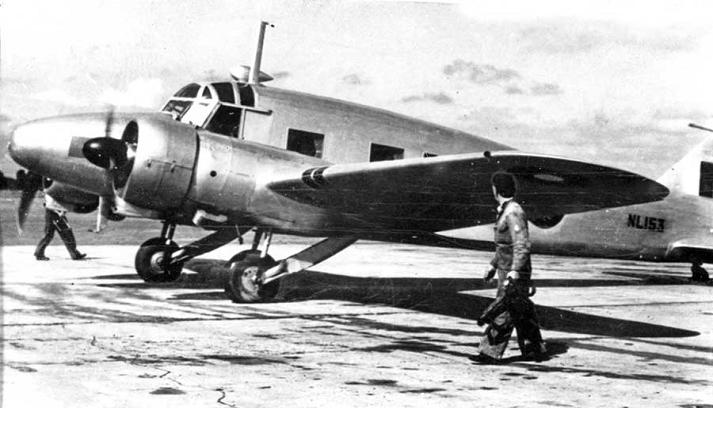
NL153 at Essendon. Geoff Goodall collection
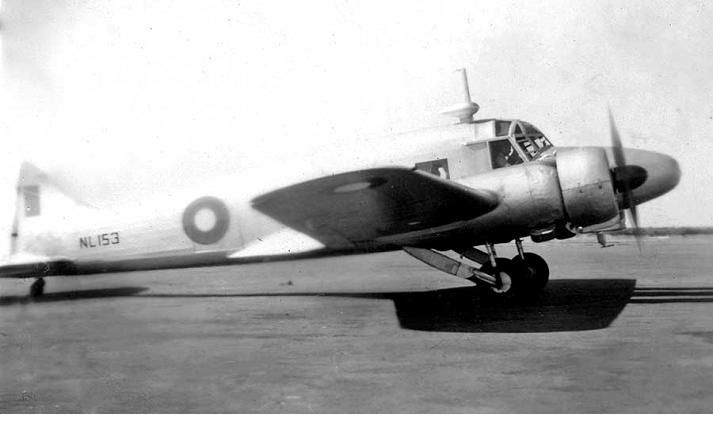
Townsville Qld. Ben Dannecker collection
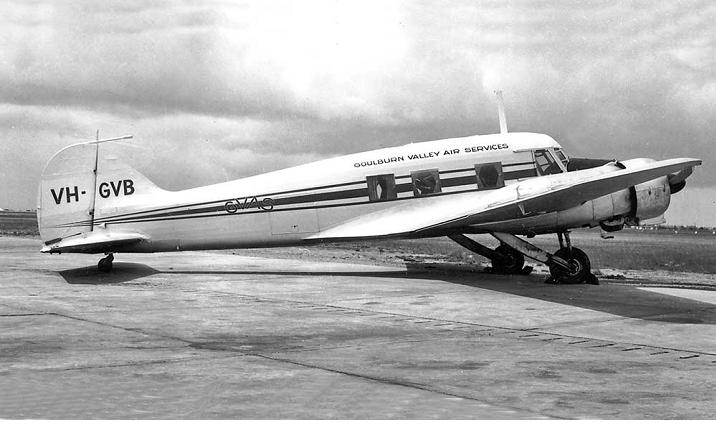
Essendon, Goulburn Valley Air Services. Photo by Eddie Coates
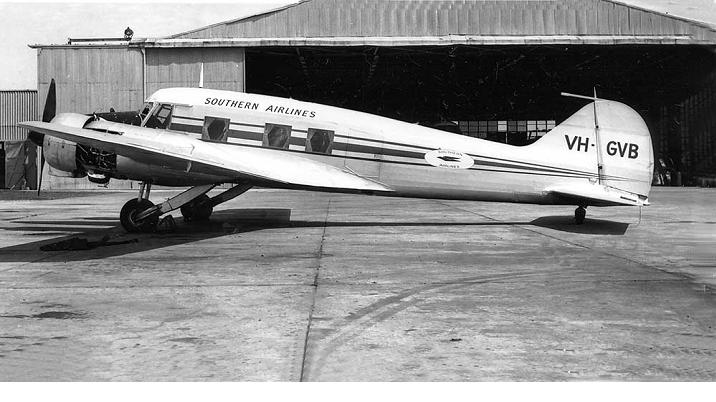
Essendon, Southern Airlines. Photo by Eddie Coates
2)
RAF 300 WING ANSON C.XIIs PH599 & PH600 based in Australia
RAF Transport Command No.300 Wing was established in Australia in 1945 to provide air transport needs for the planned British Tiger Force advance towards Japan to end WWII. 300 Wing was upgraded to 300 Group effective 28 June 1945. Main equipment was Dakotas operated by RAF squadrons based at Camden and Parafield, but two Anson 12s were shipped out for light transport tasks. Group Captain Keith M. Hampshire, whose had been CO of 280 Wing, San Diego, took over as CO of 300 Group in September 1945.
RAF 300
Wing comprised:
- 238 Squadron, Parafield: Dakotas
- 243 Squadron, Camden: Dakotas
- 1315 Flight: Dakotas and Liberator C.VIIs
- 145, 193 194 Staging Posts
- 4243 Servicing Echelon
243 Squadron
was transferred to Australia in January 1945 from Dorval, Montreal, Canada.
Based at Camden from 9 February 1945 to 15 April 1946. Equipped with RAF
Dakotas radio callsigns VM-YAA to YAZ, -YBA to YBM, -YDS to -YDU. Operated
communications flights between British forces in South West Pacific Area,
mainly British Pacific Fleet bases. After V-P Day, the scheduled
courier runs were extended to Hong Kong. A large proportion of 243 Squadron
personnel were Australians, who were demobilised locally when the Squadron
was disbanded on 15 April 1946.
238 Squadron was transferred to Australia in June 1945 from India. Based
at Parafield from 2 July 1945 to 27 December 1945, operating transport
support for the British Pacific Fleet. Equipped with RAF Dakotas radio
callsigns VM-YCN to YDR. 238 Squadron was disbanded at Parafield 27 December
1945, and reformed at Abingdon, England in January 1946.
1315 Flight Dakotas callsigns VM-YBN to -YCM, -YDV, -YDW and Liberator C.VIIs YM-YCG & -YCK
There was no direct RAAF involvement with these two Anson 12s.
ANSON C.XII PH599
| .44 | Built by A.V.Roe and Co Ltd at Yeadon Aerodrome,
Leeds as an Anson C.XII. Armstrong Siddeley Cheetah XV engines |
| Built to Air Ministry contract for a total of 264 Avro Anson C.XII and C.XIXs for RAF in serial range PH528-PH865 | |
| 15.2.45 | Taken on RAF charge as Anson C.XII PH599 |
| 15.2.45 | 22 Maintenance Unit, Silloth |
| 22.5.45 | Damaged while with 22MU |
| 7.6.45 | Repairs commenced by team from Martin Hearn Ltd, completed 12.7.45 |
| 6.45 | Allotted to No.300 (Transport) Group, Australia |
| 12.7.45 | Returned to 22MU |
| 18.7.45 | Issued to 47MU Sealand for crating for shipping |
| 1.8.45 | Moved to Liverpool docks |
| 13.8.45 | Loaded on board SS Waipawa |
| 18.8.45 | Departed Liverpool for Australia |
| 6.11.45 | Arrived Sydney docks |
| 11.45 | RAF 243 Squadron, Camden |
| 243 Sqn Dakotas had their radio callsigns painted on the tails, but no indication that PH599 had a callsign painted externally. | |
| Operated by 300 Wing for Air Commodore Grace, Australia | |
| 26.3.46 | PH599 visited Laverton during official visit by Lord Louis Mountbatten, who arrived from Canberra in a RAF York |
| .47 | Issued to New Zealand |
| 23.4.48 | Ferried from Australia to NZ |
| 5.48 | Brought on RNZAF Charge as PH599. Operated by RNZAF for British High Commissioner, New Zealand |
| 30.6.49 | Withdrawn from service, waiting for spare parts |
| 12.6.50 | Struck-off RNZAF charge. Offered for disposal |
| .50 | Registration ZK-AXY reserved for F. Butler Ltd, Hamilton |
| 19.1.51 | NZ CofA issued |
| 1.2.51 | Registered ZK-AXY F. Butler Ltd, Hamilton |
| 11.5.53 | Change of ownership: Adastra Aviation Ltd,
Tauranga Adastra was an established agricultural operator which made several attempts to run scheduled passenger services. The plans for the Anson were quickly abandoned |
| 9.6.53 | Southern Scenic Air Services Ltd wrote to the Air Department requesting that two Ansons be added to their charter licence: Anson 12 ZK-AXY and Anson 1 ZK-BCL (ex NZ418). Another Anson 1 ZK-AYJ (ex NZ410) was also purchased at that time but stripped for parts. |
| 20.7.53 | Change of ownership: Southern Scenic Air Services Ltd, Queenstown |
| 12.53 | Commenced scheduled service Queenstown-Taieri, 7 passenger seats |
| Operated freight charters carrying fish from Franz Joseph to Christchurch | |
| Retired due high maintenance costs, replaced by a DH.89 Rapide | |
| ZK-AXY parked in open at Queenstown, with two spare Cheetah engines in crates | |
| 21.7.61 | Struck-off Civil Register |
| 12.62 | Advertised for sale “as is where is”. In weathered condition |
| 12.62 | Purchased by Herm Palmer, who operated early jet boats on Shotover River. He stripped it for parts, many being donated to the Invercargill borstal. |
| Metal fuselage frame used to construct a hovercraft project which was not completed |
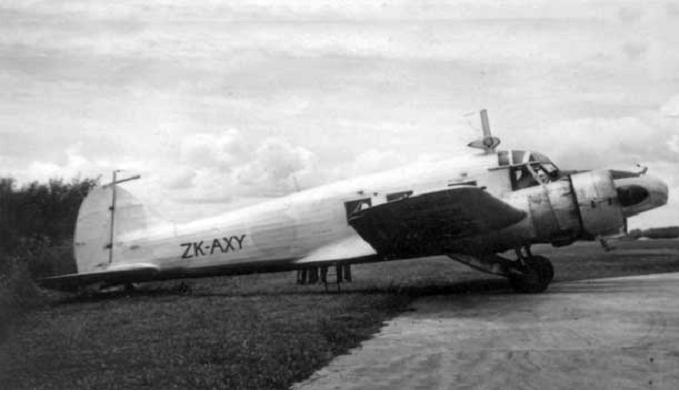
PH599
soon after registerd ZK-AXY, RAF roundel still visible.
Ed Coates Collection
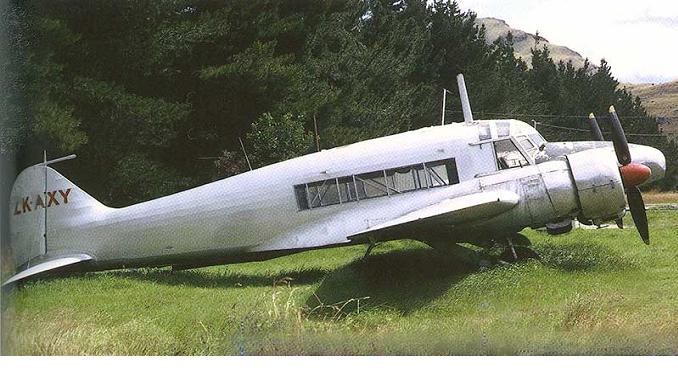
ZK-AXY retired at Queenstown. Photo by Don Noble
ANSON C.XII PH600
| .44 | Built by A.V.Roe and Co Ltd at Yeadon Aerodrome,
Leeds as an Anson C.XII. Armstrong Siddeley Cheetah XV engines |
| Built to Air Ministry contract for a total of 264 Avro Anson C.XII and C.XIXs for RAF in serial range PH528-PH865 | |
| 15.2.45 | Taken on RAF charge as Anson C.XII PH600 |
| 15.2.45 | 22 Maintenance Unit, Silloth |
| 27.5.45 | Issued to 47MU Sealand for crating for shipping |
| 28.7.45 | Departed Liverpool docks for Australia as cargo on board SS Curacao |
| 18.9.45 | Arrived Sydney docks |
| 30.1.46 | Issued 300 Wing, Australia |
| 28.2.46 | Transferred to RAF Mission, Hobsonville NZ |
| Shipped to NZ | |
| 7.46 | Assembled at Hobsonville RNZAF Base |
| .46 | Brought on RNZAF Charge as PH600. Issued RNZAF General Purpose Flight, Ohakea |
| Reported to have flown to Australia on at least one occasion | |
| 8.47 | Badly damaged in accident at Paraparaumu. Written off |
| 24.10.47 | Struck-off RNZAF charge |
| 5.48 | Replaced by PH599 transferred from Australia |
3)
AVRO C.19s VM374 & VM375 for the Adelaide-Woomera courier
These two Avro Anson C.19 transports were sent to Australia in 1947 by the UK Ministry of Supply to support the British activities at the Woomera Rocket Range in South Australia. They were transferred to RAAF charge and flown by RAAF crews but retained their British serials. The pair spent most of their RAAF careers on a passenger and freight courier service between Woomera and Adelaide, based first at RAAF Mallala, then the newly built RAAF Edinburgh.
AVRO C.19 VM374
| 6.47 | Built by A.V.Roe and Co Ltd at Woodford as an Avro
C.Mk.19 Series 2, fitted with metal mainplanes and tailplanes. Two 420hp Armstrong Siddeley Cheetah 15 engines |
| Built to Air Ministry post-war contract No.5680 for a total of 95 Avro Ansons of various models for RAF use: C.19s, T.20s and a T.22 prototype. | |
| Allocated RAF serial VM374. Allocated to Long Range Weapons Establishment, Woomera |
|
| VM374 & VM375 selected for consignment to Australia to support British operations at Woomera Rocket Range, South Australia | |
| Shipped to Australia | |
| 28.11.47 | Taken on RAAF charge as VM374. Received 1AD Laverton ex UK Ministry of Supply |
| 28.11.47 | Allotted No.2 Communications Squadron ex 1AD on completion of erection |
| 22.12.47 | Received 2 Com Sqn, Mallala |
| 31.3.48 |
RAF record card shows "struck-off RAF charge, sold" |
| 31.3.48 | 2 Com Sqn renamed No.34 Communications Squadron, still based Mallala |
| 11.7.50 |
RAAF Incident report: VM374 electrical fault in flight Mallala, F/Lt. R.H.Burr |
| 20.9.52 | VM374 noted at Mallala, fitted with 6 passenger seats |
| Based at Mallala,
operated by 34 Squadron on a courier service to Woomera rocket range in the north of South Australia. The two Avro C.19s were
supplemented then replaced by three newly delivered Percival Princes
A90-1 to A90-3 |
|
| .53 | Operated for SA Department of Mines on survey for uranium deposits, fitted with scintillometer equipment to detect radioactivity |
| 15.12.53 |
Crashed forced landing 11 miles north
west of Port Lincoln SA.
During uranium survey flight. Crew unhurt: Pilot RAAF Flt Sgt J.B.Browne,
navigator Flying Officer Mike Wood and two Mines Department officers. |
| RAAF Status card: starboard engine failed at 200 feet, unable to maintain height. Forced landing, aircraft over ran cleared area, stopping in dead timber. Mainplanes and rear empennage sheared off and fuselage broken just forward of rudder. Engine failure may have been caused by the loss of bronze bush on exhaust rocker holding bolt. | |
| Damaged aircraft moved by road to Mallala | |
| 31.5.54 | Approval granted to convert to components at 34 Sqn. Engines to be held as repairable |
| 20.9.54 | Substantially complete wreck stored in an unguarded area behind a hangar at RAAF Mallala. During that day’s annual airshow, young boys demolished the airframe to rubbish while playing in it. |
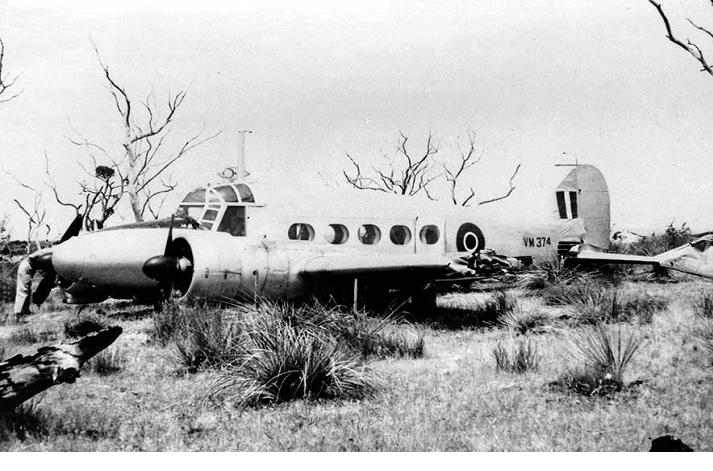
Port
Lincoln SA, 15 December 1953, still with RAF roundel.
Geoff Goodall collection
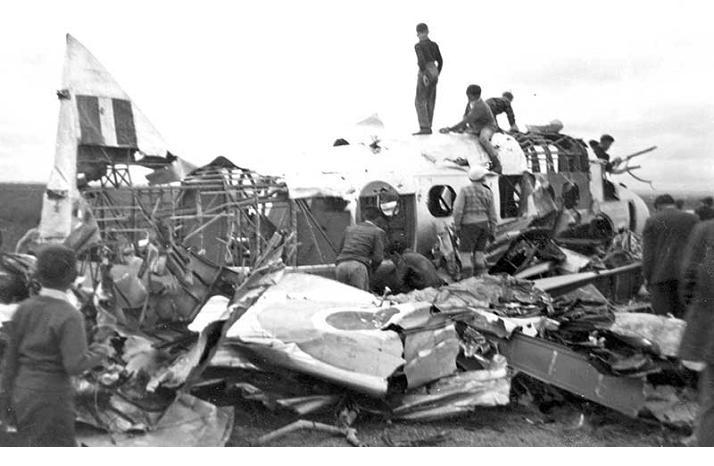
VM374’s final demise at RAAF Mallala on 20 September 1954. Photo by John M. Smith
AVRO C.19 Series II VM375, VH-BIX
| 12.6.47 | Built by A.V.Roe and Co Ltd at Woodford as Avro C.Mk.19 Series 2, fitted with metal mainplanes and tailplanes. Two 420hp Armstrong Siddeley Cheetah 15 engines |
| Built to Air Ministry post-war contract No.5680 for a total of 95 Avro Ansons of various models for RAF use: C.19s, T.20s and a T.22 prototype. | |
| Allocated RAF serial VM375. Allocated to Long Range Weapons Establishment, Woomera |
|
| VM374 & VM375 selected for consignment to Australia to support British operations at Woomera Rocket Range, South Australia | |
| Shipped to Australia | |
| 28.11.47 | Taken on RAAF charge as VM375. Received 1AD Laverton ex UK Ministry of Supply |
| 28.11.47 | Allotted No.2 Communications Squadron ex 1AD on completion of erection |
| 18.12.47 | Received 2 Com Sqn, Mallala |
| 31.3.48 | RAF record card shows "struck-off RAF charge, sold" |
| 31.3.48 | 2 Com Sqn renamed No.34 Communications Squadron, still based Mallala |
| 1.7.48 | RAAF Incident Report: VM375 port propeller damaged by stones while taxying at Pimba SA. W/O R. Harrod with 5 passengers |
| 2.12.50 | Forced landing Woomera SA when escape hatch blew off. Slight damage to fabric. Repairable at unit. |
| 20.9.52 | VM375 noted at Mallala, in static aircraft park during the annual RAAF air display |
| 20.9.53 | VM375 noted at Mallala, in static aircraft park during the annual RAAF air display |
| 54 | Completed the uranium mineral survey task carried out by VM374 until it crashed at Port Lincoln SA on 15.12.53. RAAF pilot was Roy Scafe and the scintillometer equipment was operated by Maurie Miller. |
| 20.9.54 | VM375 noted at Mallala, in static aircraft park during the annual RAAF air display |
| 20.9.55 | VM375 noted at Mallala during the annual RAAF air display |
| 13.10.55 | Received Air Trials Unit, RAAF Edinburgh ex 34 Sqn for storage |
| 2.12.50 |
RAAF Incident Report: VM375 pilot emergency hatch blew out in flight near Lake Dutton SA |
| 16.12.55 | Allotted Maintenance Squadron Edinburgh ex ATU for storage |
| 30.4.56 | Approved for disposal with Cheetah engines installed |
| 18.7.56 | Allotted Base Squadron Edinburgh ex MS Edinburgh for storage pending disposal |
| 15.11.56 | RAAF Status Card: despatched to Carsair Air Service, Port Moresby |
| 15.3.57 | Civil Registration application: Robert Glen
Carswell t/a Carsair Air Service, Port Moresby, New Guinea
|
| 3.57 | Civil conversion at Port Moresby. |
| 18.3.57 | Interim CofA issued by DCA Port Moresby office, effective until 17.5.57 pending Head Office approval for full CofA because it is the first of its type on the Register |
| 29.4.57 | Letter to DCA Port Moresby from DCA Head Office, Melbourne: “We are not prepared to issue a CofA for this aircraft unless we can obtain all RAAF and Air Ministry publications necessary for its operation, maintenance and overhaul.” |
| 21.5.57 | Registered as Avro C19 VH-BIX |
| 21.5.57 | CofA issued, 2 crew and seating for 13 passengers: 7 European plus
6 native seats Approved MAUW: 9450 lb (passengers), 10,400 lb (freight) |
| 57 | Joined Carsair’s fleet based at Port Moresby : 4 Ansons, Lockheed 10, Lockheed 12, Norseman, Beech 17 which flew charters while Carswell applied to DCA for approval to operate scheduled passenger services |
| 57 | Carswell requested a higher MAUW to allow increased payload. DCA Head Office respond that it would consider the request subject to VH-BIX being made available for a performance test flying program supervised by Departmental officers, all costs to be born by the owner. |
| 1.58 | Advertisement in Pacific Islands Monthly: Carsair Air Service, Port Moresby have Anson, Avro 19 and Beech 17 type aircraft available for charter |
| 12.8.58 | Damaged on take-off at Aroa Plantation, New Guinea on a charter
flight. DCA Accident report: “Directional control was lost when a tyre blew out during take-off. The starboard undercarriage collapsed.” The aircraft slewed violently, forcing the starboard undercarriage leg up right through the metal wing. |
| World Wide Air Services, Port Moresby took the insurance company job to repair VH-BIX at Aroa, sending their engineer Phil Bennett. He recalls “I went there, pulled all the crumpled metal off, went back to town and made up ribs and stuff, and rebuilt the thing. Then Bill Vink flew it to Moresby and it went to Brisbane. Carsair was just about finished in Papua New Guinea.” | |
| 10.58 | Bob Carswell abandoned New Guinea because of DCA’s lack of policy for issuing airline licences for scheduled services for internal New Guinea routes. He withdrew his aircraft to his maintenance base at Archerfield Airport, Brisbane |
| 1.10.59 | VH-BIX test flown at Archerfield by R.G.Carswell after CofA renewal. Probably after the full repair of the damage received 12.8.58 |
| 10.60 | Carswell commissioned aeronautical engineer Newton Hodgekiss of Southern Cross Aviation, Toowoomba Qld to provide engineering and stress analysis to support his proposal to re-engine VH-BIX. He planned to replace the Cheetah XVs with Pratt & Whitney R-1340-S1H1-G as used in RAAF Wirraways and later fitted to Gibbes Sepik Airways Norsemans in New Guinea. Not proceeded with. |
| 10.60 | Lease/purchased from Carsair by Air Culture Pty Ltd,
Maylands Aerodrome, Perth WA. Air Culture was an agricultural operator founded by former airline pilot Captain William G. Boulden, who had gained a contract from Ross International Fisheries, Perth to transport live crayfish from fishing ports north along the WA coastline as far as Snag Island back to Perth. |
| 6.10.60 | DCA file memo: VH-BIX is currently based in WA. It has the 9 passenger seats removed and is operating as a freighter. |
| 30.11.60 | Flew two return trips Perth Airport (Guildford) to Snag Island and return, pilots Bill Boulden and John Grummels. The load of crayfish at Perth was weighed after both flights and found to be over the allowed weight on both occasions. Letter of reprimand sent to Air Culture Pty Ltd. |
| 21.1.61 |
Letter
from Captain W.G.Boulden, Managing Director of Air Culture Pty Ltd to
Brain and Brown Airfreighters, Melbourne: replying to their earlier
letter offering to purchase Avro 19 spare parts: "We would be pleased to assist you in this matter if possible, but you will readily understand that with its extensive spares backing, the Avro XIX is probably the most useful aircraft of its general type in Australia. In the event of these spares being disposed separately, the value of this aircraft wlould be affected most adversely. We would not, therefore, be prepared to sell the spares separately. However, should you be interested in the purchase of the aircraft with all spares, we would be prepared to sell to you at the price recently paid by us - £6,000 plus £200 to cover expenses. The reason for our offer to you so soon after purchasing is that we have now been able to secure a smaller aircraft which is adequate for our present reduced loadings." |
| .61 | Carswell sold VH-BIX to Z. A. “Terry” Brain
t/a Brain and Brown Airfreighters, Moorabbin Airport, Melbourne. The deal included all spare parts, including an unused Anson C.19 mainplane still held at a RAAF Stores Depot in South Australia. |
| 3.61 | Terry Brain recalls being just about to leave Melbourne for Perth to collect VH-BIX when he was advised of its forced landing. |
| 22.3.61 |
Badly damaged in forced landing 7 miles
north of Lancelin WA.
Pilot Bill Boulden was carrying £600 value of crayfish and two passengers
from Jurien Bay to Perth. |
| DCA accident report: “Following complete loss of starboard engine power, probably initiated by the failure of a piston, the pilot was unable to maintain height and in the subsequent forced landing, the aircraft collided with a limestone outcrop.” | |
| Aircraft loaded on a semi-trailer and moved by road to Maylands Aerodrome, Perth. It was a difficult recovery due to terrain at the inaccessible forced landing site. | |
| 4.61 | Bob Carswell arrived Maylands from Brisbane in his Lockheed 12A VH-ASG, which was leased by Air Culture to take over the crayfish contract. En route Carswell had picked up a Brain & Brown ground engineer, who commenced stripping VH-BIX of its usable parts at Maylands. |
| .61 | Major components of VH-BIX including the metal mainplane and tailplane were moved from Perth to Moorabbin by road. |
| 61 | Brain and Brown Airfreighters gained DCA approval to rebuild of one of their Anson Mk.1s VH-BAF using an Avro 19 metal mainplane and metal tailplane. This modified aircraft would not be affected by the DCA Australian type grounding of all Anson Mk.1s effective 30.6.62. |
| Original plan was to use the tailplane and mainplane of VH-BIX, however the wing was badly damaged by the time it reached Moorabbin. So only the tailplane structure was used and a spare mainplane ex RAAF Stores which Bob Carswell had left in SA was incorporated in the rebuild of VH-BAF. | |
| 23.2.63 | Remains of the fuselage of VH-BIX noted dumped in grass near the boundary fence of Maylands Aerodrome, Perth. Small parts had been removed by members of the WA Light Aircraft Association and stored in their hut on the aerodrome. By 9.63 the fuselage had reduced to a pile of weather-beaten wood and fabric |
| 20.5.63 | Parts of VH-BIX noted stored inside the Brain and Brown hangar alongside the rebuild of VH-BAF |
| Terry Brain was hopeful of orders for additional modified metal wing Ansons, in which case he would have repaired the damaged mainplane of VH-BIX to use on the next aircraft. However no follow-on orders eventuated and the remains of VH-BIX were sold for scrap. | |
| See Avro 652AM VH-BAF below |
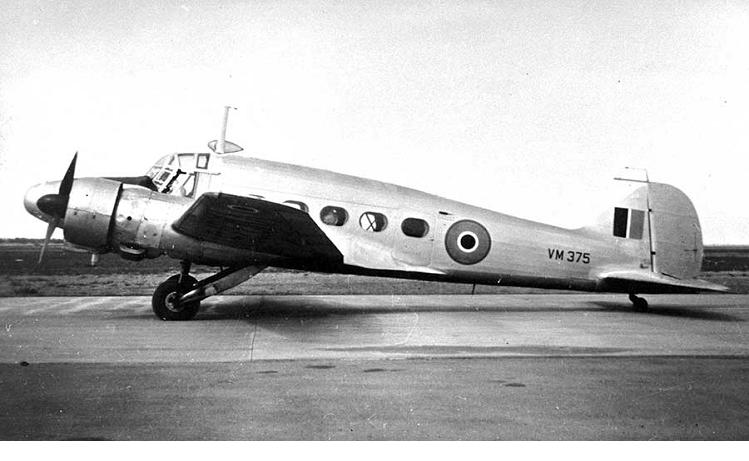
VM375 as a new aircraft with RAF type C roundel. Geoff Goodall collection
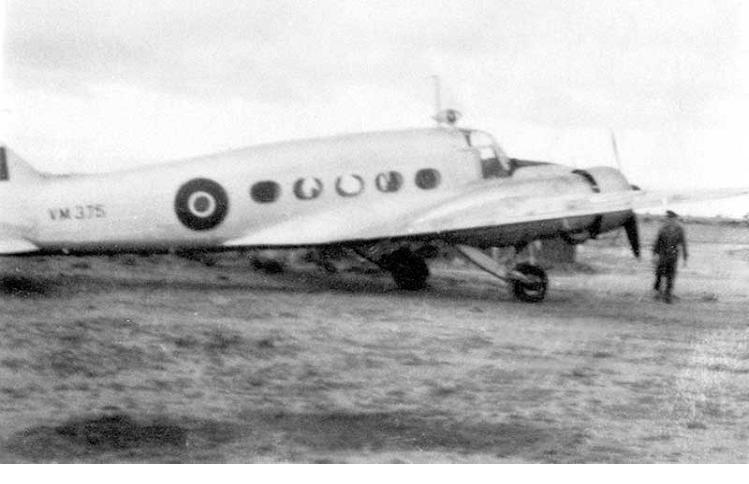
VM375 in 1954 conducting the aerial survey for uranium deposits for
the SA Mines Department. The Anson is still wearing the original
roundel.
Photo: Doug Morrison collection
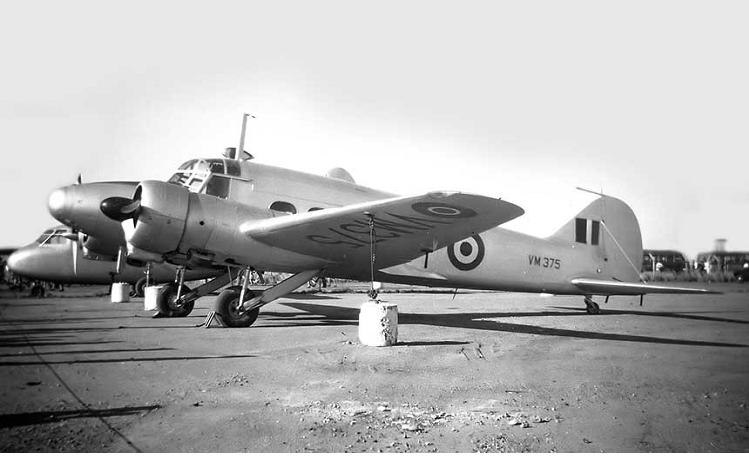
RAAF Mallala SA, September 1955, with changed roundel and fin flash. Geoff Goodall collection
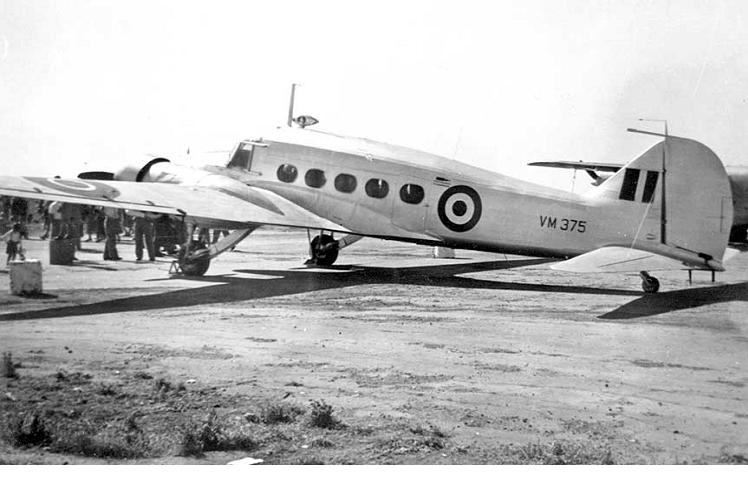
VM375 at RAAF Mallala, September 1955. Photo by John M. Smith
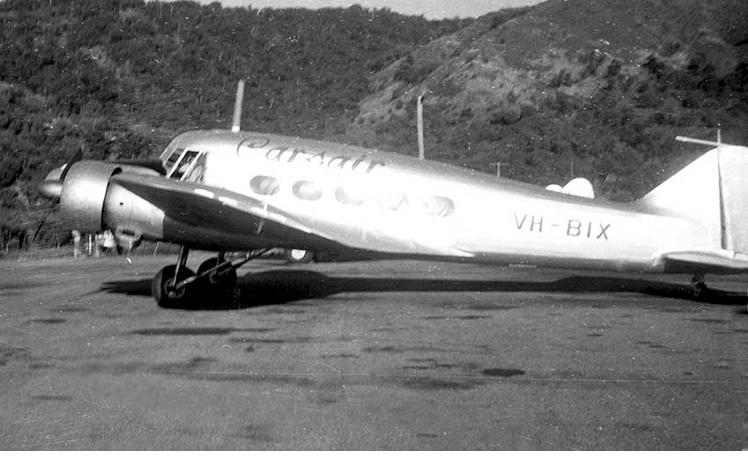
Now civilianised as VH-BIX with Carsair Air Service, Port Moresby. Seen at Cairns Qld in 1957. Geoff Goodall collection.
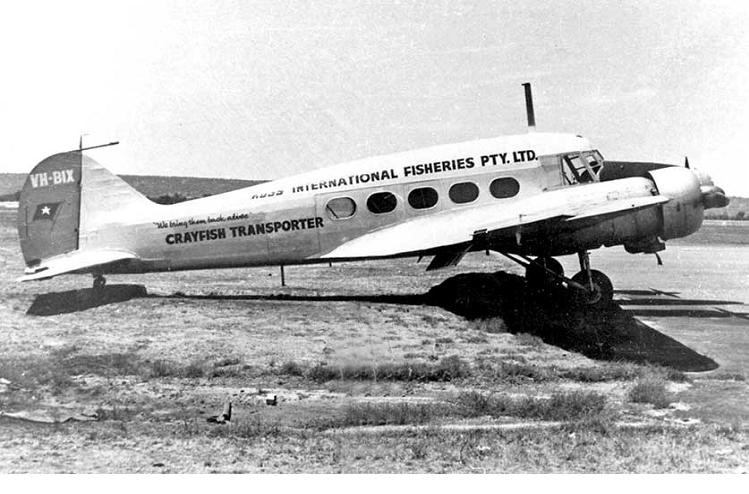
VH-BIX at
Perth Airport early 1960, while leased to Air Culture Pty
Ltd.
Geoff Goodall collection
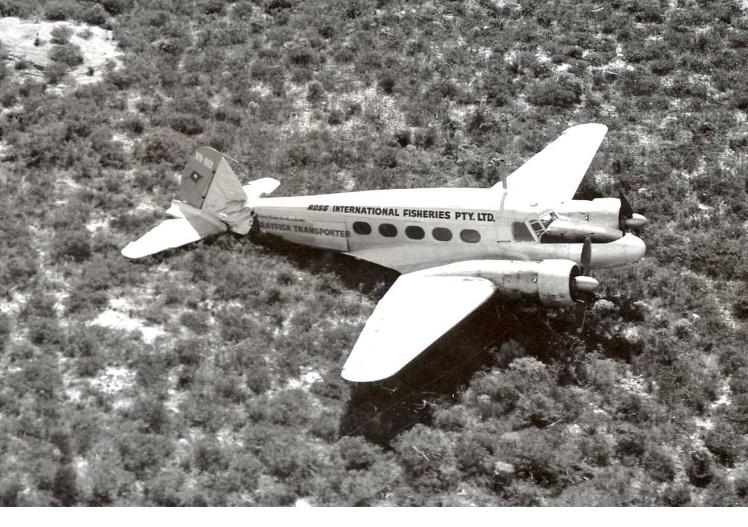
Forced landing near Lancelin WA in March 1961. Geoff Goodall collection
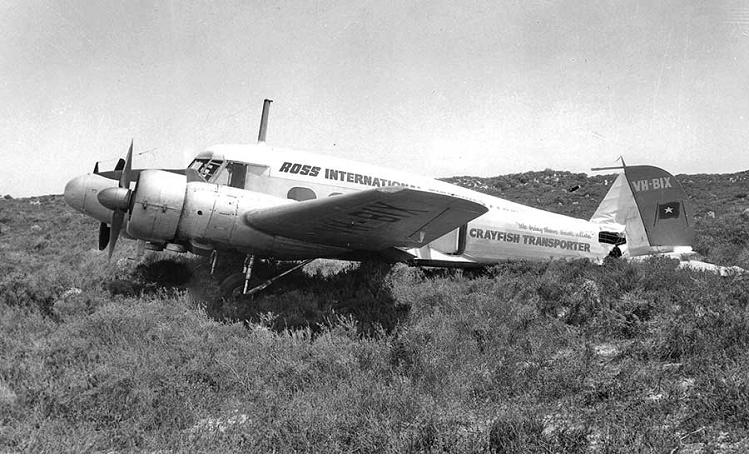
The rear fuselage and tailplane were severely damaged. Geoff Goodall collection
4) AVRO 19 SERIES 2 VH-RCC imported in 1962 by Nicholas Air Charter
AVRO 19 series II c/n 1351 VH-RCC
| Built by A.V.Roe and Co Ltd at Yeadon Aerodrome, Leeds as Avro 652A Nineteen Series 1. C/n 1351. Armstrong Siddeley Cheetah 15 engines. | |
| 5.7.46 | Registered as an Avro 19 Series 1 G-AHXK Hunting Air Travel Ltd, Newcastle |
| 8.10.46 | CofA issued |
| 10.46 | One of three new Avro 19s delivered to Hunting Air Travel for charter
operations. G-AHXK was named Eland |
| 10.3.48 | Change of ownership: Sivewright Transport
& Storage Ltd, Manchester. Mancunia Replacement for Anson 1 G-AIXE also named Mancunia which was wrecked in a forced landing 7.1.48 near Knutsford |
| Operated on Sivewright Airways Ltd scheduled passenger services from Manchester to Jersey, as well as charters. All silver with “Sivewright Airways” titles above windows and name “Mancunia” on nose. | |
| 3.51 | Sivewright Airways ceased operations. After expanding with three Dakotas the company shut down because of the uncertainty of regular freight work to keep the airline economical. The company hangar at Manchester-Barton was cleared out and leased for storage of phosphate. |
| 7.8.52 | Change of ownership: Hawker Aircraft Ltd,
Langley. Named Peta Based at Dunsfold as company communications aircraft between manufacturing plants |
| .54 | Converted to Avro 19 Series 2 with metal wings |
| Regular use in UK as Hawker’s company aircraft | |
| 14.11.61 | G-AHXK visited Southampton, arrived from Dunsfold. Royal blue with gold trim and “Hawker Aircraft Ltd” on the tail. |
| 13.7.62 | Letter to DCA from Richard Cavill, Director of Nicholas Air Charter Pty Ltd, Melbourne: he intends flying Avro 19 Series 2 from England to Melbourne. Registration VH-RCC has already been reserved for the aircraft. |
| 10.8.62 | Richard Cavill visits the Australian High Commission, London for discussions regarding the ferry flight. |
| 13.8.62 | British Register Change of ownership: Nicholas Air Charter Pty Ltd, Melbourne Vic |
| 13.8.62 |
G-AHXK
arrived at Portsmouth on delivery to Hants and Sussex Aviation for
inspection in preparation for ferry flight to Australia. During
inspection the registration was repainted as VH-RCC |
| 10.9.62 | Struck-off British Register as sold to Australia |
| 21.9.62 | Registered VH-RCC Nicholas Air Charter Pty Ltd, Melbourne Vic |
| 21.9.62 | DCA issue Temporary Australian CofA for the delivery flight |
| 24.9.62 | VH-RCC noted at White Waltham, retains the royal blue paint scheme
with gold trim. “Nicholas Air Charter Pty Ltd” painted in gold above
the cabin windows, and Nicholas “N” in gold on each side of the rudder. Based here for a week while conducting pilot endorsements and IFR flying training |
| 27.9.62 | VH-RCC noted at Shoreham |
| 29.9.62 | VH-RCC noted at White Waltham, also 30.9.62 flying |
| 1.10.62 | Departed Gatwick on flight to Australia flown by Richard Cavill with two companions. |
| 27.10.62 | Arrived Moorabbin on delivery flight, routing via Perth WA |
| Inspection at Moorabbin for issue of full Australian CofA | |
| 22.2.63 | First test flight Moorabbin after overhaul and incorporation of mods. |
| 2.63 | Full Australian CofA issued |
| Based Moorabbin, flown on charter work. Purple and gold | |
| 10.3.63 | visited airshow at Morwell Vic |
| 17.5.63 | noted at Moorabbin, parked outside on grass near Tower |
| 63 | Nicholas Air Charter purchased a controlling interest in SA
Air Taxis, Adelaide SA. Most NAC aircraft moved base from Moorabbin to Adelaide Airport |
| 3.7.63 | VH-RCC ferried Moorabbin to Adelaide Airport. Based there for charter work for the combined companies. Retained titles “Nicholas Air Charter” and “N” on the rudder |
| 10.7.63 | noted Adelaide Airport, flying. Also 25.7.63 |
| 7.9.63 | Engine runs on the ground at Adelaide Airport. By now the Avro is flying only occasionally |
| 10.10.63 | Ferried Parafield-Adelaide Airport after maintenance |
| 7.12.63 | noted at Adelaide Airport: the royal blue paint is peeling badly and previous registration G-AHXK can be clearly read. Engines are dirty and oil stains on the cowlings have not been cleaned. Aircraft generally appears to be in poor condition. |
| 25.1.64 | Arrived back at Adelaide Airport after being absent for a month |
| 28.1.64 | Flew charter Mildura-Adelaide carrying a rock music group |
| 11.2.64 | Local flight Adelaide, also 14.2.64, 15.2.64 |
| 23.2.64 | Last flight, retired Adelaide Airport. Local flight for photographic work over nearby Mount Lofty in the Adelaide Hills. |
| 27.2.64 | CofA expired. Richard Cavill stated that he intended to renew the CofA during an overhaul and convert the Avro for freight work. It will be repainted in the new SAAT scheme of white with blue trim, with a gold “N” for Nicholas Air Charter |
| 27.2.64 | Struck-off Register. Left parked in the open weather at Adelaide Airport |
| 6.6.64 | noted Adelaide Airport: rudder removed, paint peeling extensively along fuselage. Radio aerial wires hanging down on to the ground. |
| 25.12.64 | unmoved at Adelaide Airport, now looks completely derelict |
| 9.11.65 | Wings were detached outer of the engines, and removed |
| 14.11.65 | Towed by road from Adelaide Airport to Parafield Airport, departed at 6am |
| Stripped at Parafield of usable parts. Remainder donated to Airport Fire Service | |
| 8.1.66 | Metal wings of VH-RCC noted in DCA hangar at Parafield |
| 8.4.64 | VH-RCC stripped hulk standing on its undercarriage, outside DAP hangars at Parafield |
| 22.4.66 | Destroyed for fire practice at Parafield Airport SA |
| 7.67 | Metal outer wings of VH-RCC noted dumped in metal scrap at Sims
Metals yard, Wingfield, Adelaide. Wings still in the yard on later visits 7.79, 7.70, |
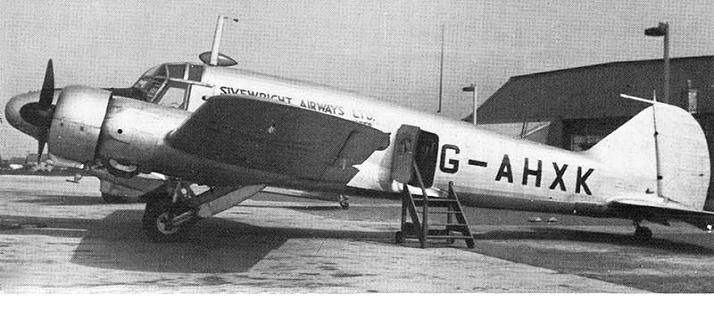
G-AHXK with Sivewright Airways
Ltd.
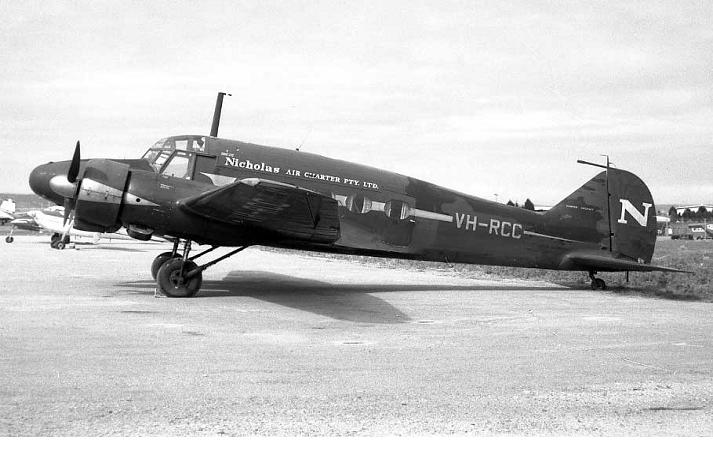
VH-RCC Adelaide Airport, September 1963, paint already faded. Photo by Geoff Goodall
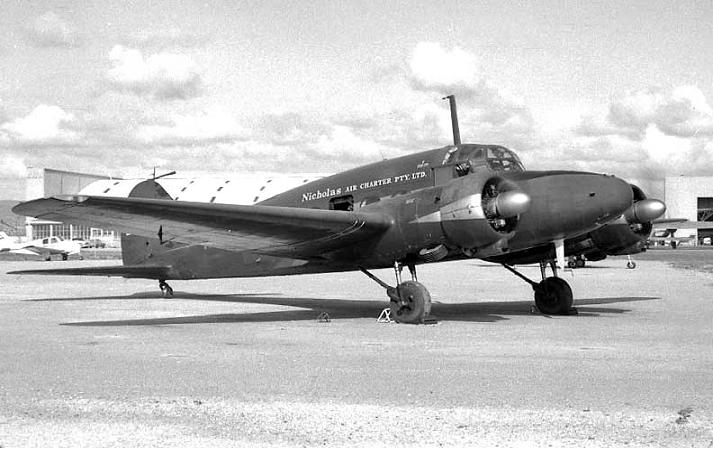
Adelaide October 1963. Photo by Geoff Goodall
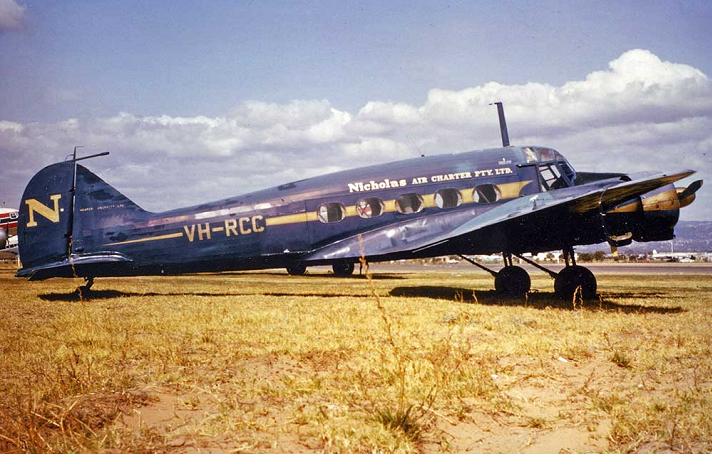
Adelaide Airport, February 1964. Photo by Barney B. Deatrick
5) AVRO 652A (MODIFIED) VH-BAF Mk.1 converted to metal wing and tailplane:
AVRO ANSON Mk.1, to Avro 652AM (Modified) Mercury (VH-BLP), VH-BAF, ZK-RRA
| .43 | Built by A.V.Roe and Co Ltd at Yeadon near Leeds
as Avro 652A Anson Mk.1 Armstrong Siddeley Cheetah 15 engines. |
| Built to Air Ministry contract for a total of 800 Anson 1s with serial range MG102-MH237 | |
| Issued RAF serial MH120. Issued to RAAF under Empire Air Training Scheme. | |
| Shipped to Australia | |
| 20.3.44 | Taken on RAAF charge as MH120. Received No.2 Aircraft Park, Bankstown ex UK |
| 20.3.44 | Under erection at 2AP |
| 20.4.44 | Received 1 Air Observers School, Evans Head ex 2AP |
| 12.2.45 | Issued Advanced Flying and Refresher Unit, Deniliquin ex 1AOS, to be fitted Marconi W/T and astrodomes |
| 3.10.45 | Transferred to AFRU Storage Reserve ex unit equipment |
| 10.4.46 | Selected for post-war use, to be stored Category C at Care & Maintenance Unit, Deniliquin |
| 12.12.47 | Received 1AD Laverton ex CMU Deniliquin pending further instructions |
| 25.2.48 | Received Dept of Aircraft Production, Parafield |
| 29.10.48 | Received Airflite Pty Ltd, Bankstown ex DAP Parafield for complete overhaul |
| 25.10.49 | Received 2AD Richmond ex Airflite, for fitment navigation equipment |
| 14.11.49 | Received 3AD Amberley ex 2AD |
| 18.4.50 | Received RAAF Station East Sale ex 3AD |
| 19.5.50 | Received School of Air Navigation. East Sale ex RAAF Station East Sale |
| 25.8.50 | Transferred to RAAF Station East Sale ex SAN |
| 22.2.51 | Downgraded from Category B storage to Category C and allotted to Tocumwal |
| 13.3.51 | Received 1AD Detachment B, Tocumwal ex East Sale for Cat C storage |
| 9.1.52 | Downgraded to Category D storage at Tocumwal |
| 1.7.52 | Held at Tocumwal in Category D storage under cover |
| 15.9.52 | Offered for disposal on list AIR 7192 |
| 23.2.53 | Sold for £100 to Greenfield’s Air Taxis, Aerodrome, Albury NSW |
| Purchased by A. M. “Gus” Greenfield, proprietor of Greenfield’s
Air Taxis to replace their Avro Anson VH-BLP (ex RAAF DG913). It had
been used for general charter work, along with Proctor VH-AYV, both
owned by John McInnerney who also traded as Air Taxis, Albury. On 27.8.52 VH-BLP commenced a scheduled passenger service Albury-Holbrook-Wagga, under the name “Albury Air Service”. Service discontinued 24.9.52 due low passenger demand, but freight carried was considered to be promising. The muddy surface of Albury aerodrome was also a factor. VH-BLP CofA expired 14.10.52 and unable to be renewed due to the deteriorated condition of the main wing spar. Gus Greenfield recalls finding a frog living in the damp rotted woodwork inside the wing. |
|
| Gus Greenfield recalled that MH120 had just had a major overhaul prior to being placed in storage at Tocumwal and that it was the fastest Anson he ever flew. | |
| Original plan was to rebuild VH-BLP using the complete mainplane
of MH120. Greenfield acquired several other Ansons to provide spare
parts for the rebuild. Riverina Aircraft Services, Albury had maintained VH-BLP while it was in service. |
|
| 8.53 | DCA reserved registration VH-BLP for MH120 at the request of John McInnerney |
| 11.1.55 | VH-BLP noted at Albury aerodrome, retired in the open with damaged wing, in poor condition with “Albury Air Service” titles. MH120 was parked nearby in the open, still in RAAF paintwork |
| Work did not commence on civil conversion of MH120 at Albury. Greenfield’s Air Taxis had ceased operations by 1955 | |
| - | Sold to Brain and Brown Airfreighters, Melbourne |
| 25.5.57 | MH120 noted at Moorabbin, still in RAAF markings, weathered appearance |
| 9.9.57 | Added to Civil Register as VH-BAF: Aerocartographic Service Pty Ltd, c/- Brain & Brown Airfreighters Pty Ltd, Moorabbin Airport, Melbourne Vic |
| Whether VH-BAF was used for aerial survey is unknown, but it was normally used alongside other Brain & Brown Ansons as a freighter between Tasmanian towns and Bass Strait islands to Melbourne, specialising is carriage of crayfish. | |
| 7.10.60 | Crashed on takeoff Moorabbin. DCA accident report: “An incorrectly installed tyre inner tube burst during take-off run inducing a ground loop and collapse of the undercarriage.” The Anson was departing for King Island to collect crayfish when the starboard tyre deflated and starboard undercarriage collapsed. Pilot J. Mansbridge and copilot unhurt. |
| 7.10.60 | Struck-off Register |
| Dismantled aircraft stored in Brain & Brown hangar at Moorabbin. Repair not economical due to DCA restrictions on Anson operations prior to the type grounding which would be effective 30.6.62 | |
| 61 | Brain and Brown gained DCA approval for a rebuild of VH-BAF using an Avro 19 metal mainplane and metal tailplane. This modified aircraft would not be affected by the DCA Australian type grounding of all Anson Mk.1s. |
| Original plan was to use the tailplane and mainplane of VH-BIX, however the wing was badly damaged by the time it reached Moorabbin. So only the tailplane structure was used and a spare mainplane ex RAAF Stores which Bob Carswell had left in SA was incorporated in the rebuild of VH-BAF. | |
| 16.8.61 | John H. Wilson, Managing Director of Executive Air Services Pty
Ltd, Essendon Airport, Melbourne wrote to DCA: “This company has been commissioned
by Brain and Brown Airfreighters to provide technical control for
Avro Anson modifications:
It is proposed that this first converted
Anson will fly in early December and the second aircraft will be
fitted with P&W R-985 Wasp Junior engines.”
|
| 2.62 | Wilson wrote to DCA advising that Executive Air Services’ involvement is now cancelled. Work has proceeded slowly and conversion of the first aircraft is not very far advanced, although fuselage and centre-section are now joined. |
| 11.62 | VH-BAF rebuild under way in B&B hangar Moorabbin. Metal tail group has been incorporated and Cheetah XV engines installed. |
| 25.1.63 | Outer wings now fitted in B&B hangar |
| 24.5.63 | VH-BAF first test flight at Moorabbin. Further test flights for DCA performance evaluation took place in May and June 1963. Pale blue/green and white paint scheme. |
| Among the modifications installed: - hydraulic undercarriage activation replaced the original hand-cranked system - hydraulic flap activation - cockpit controls and instrumentation to DC-3 layout for pilot training for B&B DC-3s - Cheetah XV engines with Rotol two blade constant speed props |
|
| 16.8.63 | Restored to Register as type Avro 652AM (Modified) VH-BAF: Brain & Brown Airfreighters Pty Ltd, Moorabbin Airport |
| Based Moorabbin, used for freight and passenger charters | |
| Later had name Mercury painted on nose | |
| 29.8.66 | Departed Moorabbin on Tourist Safari flown by Brain & Brown Airfreighters partner Bill Brown: to Broken Hill, Darwin, Carnarvon, Jandakot, Kalgoorlie, Moorabbin |
| 23.9.66 | Departed Moorabbin on a second Tourist Safari flown by Bill Brown: to Cairns, Horn island, Brisbane, Sydney |
| 5.5.68 | Flew parachuting sorties at Lower Light SA, pilot Terry Brain. Brain says in a press report “She will go on flying forever” |
| 15.2.70 | Visited airshow at Bendigo Vic |
| 30.9.70 | Visited the new Melbourne-Tullamarine Airport for the opening ceremony. Dripped copious oil on the fresh white concrete apron. |
| 1.71 | Terry Brain flying VH-BAF won a pylon racing event at Moorabbin |
| 3.72 | Brain & Brown Airfreighters moved base to Essendon Airport, Melbourne. |
| 2.10.74 | Struck-off Register as withdrawn from service at Essendon |
| 10.3.75 | Special permit approved by CAA to fly from Essendon to Hobart and return for Tasmanian centenary celebrations |
| 13.3.75 | Special permit approved by CAA to fly from Essendon to Sunbury for a picnic fly-in. |
| 74/78 | Parked in Brain & Brown/Air Express hangar at Essendon, with lengthy periods parked outside |
| 79 | Overhaul commenced in B&B hangar Essendon to renew CofA. Was to take five years |
| 4.4.80 | Noted Essendon, appears complete and repainted silver and blue. “Terry and Richie Brain” painted over the windows, and name The last of the lot on the nose |
| 11.82 | Parked outside at Essendon, restoration completed, aircraft has been weighed and compass swung. Reported ready to be test flown, however there were further delays |
| 13.1.84 | Restored to Register VH-BAF: Z. A. (Terry) Brain, Melbourne Vic |
| 19.1.84 | First test flight Essendon by Terry Brain and Russ Legg, airborne at 2.16pm. First flight for nine years. |
| 1.84 | A further two weeks of test flights at Essendon and Bacchus Marsh Vic, with Dept of Aviation airworthiness inspector Clive Philips |
| 24.4.84 | Visited airshows at Mangalore Vic and Wangaratta Vic |
| 31.8.84 | Flew Essendon-Ballarat Vic, pilots Terry Brain and Russ Legg. Loaned to Eureka Aviation Museum who kept the Anson in their hangar |
| 16.2.85 | Flown during airshow at Ballarat, pilots Terry Brain and Russ Legg. |
| 20.3.86 | Visited airshow at Mangalore Vic |
| 2.87 | Major overhaul at Ballarat |
| 22.2.87 | Flown during airshow at Ballarat, pilots Terry Brain and Russ Legg. |
| 2.6.88 | Flown Ballarat-Essendon |
| 25.8.88 | Flown Essendon-Wangaratta by Terry Brain, for long-term loan to Air World for display. In a press report Terry was quoted “This Anson is a real plane. It’s the smell, you know. All hydraulics and oil.” |
| 4.90 | Flew at Point Cook during filming of a TV production Half A World Away covering the 1934 MacRobertson Air Race from London to Melbourne. The Anson was painted to represent Boeing 247D NR257Y The Warner Bros Comet, which was placed third outright flown by American Roscoe Turner. |
| 90-02 | Displayed at Wangaratta in Air World hangar, still painted as “NR257Y” |
| 1.02 | Air World closed to the public. VH-BAF was among the Air World aircraft collection advertised for sale |
| 4.02 | Purchased from Terry Brain by Bill Reed,
Wakefield, Nelson New Zealand Total flying hours since metal wing installed in 1963 was only 387 hours. |
| 6.02 | VH-BAF was dismantled at Wangaratta for shipping to NZ. A total of six shipping containers were filled at Wangaratta. |
| Purchased at the same time was the fuselage of Avro Anson 1 N1334 owned by Ron Lee, who had commenced a cosmetic restoration at Wangaratta utilising the original style sloping cockpit windows. This Anson had been recovered by Ron from a farm near Mildura: it had last served with 2OTU Mildura where it was sold by disposals after the war. | |
| 02 | VH-BAF stored dismantled in a hangar at Nelson Airport NZ for six months, then moved to Bill Reed’s farming property at Wakefield where a large hangar was built. |
| 03-12 | VH-BAF restored to airworthy condition at Wakefield, being returned
to full military configuration. Cabin windows replaced by original
military glasshouse, dorsal turret installed, helmet engine cowlings,
sloping cockpit windscreen (frame from N1334). Completed in RAF Coastal
Command camouflage as “K6183 VX-B”. The fuselage of N1334 was alongside for use as a pattern when needed. |
| 5.12 | Moved by road 30 km to Nelson Airport, for final assembly and test flying |
| 17.7.12 | First flight Nelson. Pilot in command was CAA authorised test pilot David Phillips, with owner Bill Reed in right seat. Further flights that day by test pilot Sean Perrett. |
| 7.12 | Registered ZK-RRA Bill and Robyn Reid, Wakefield NZ |
| Currently flying in NZ |
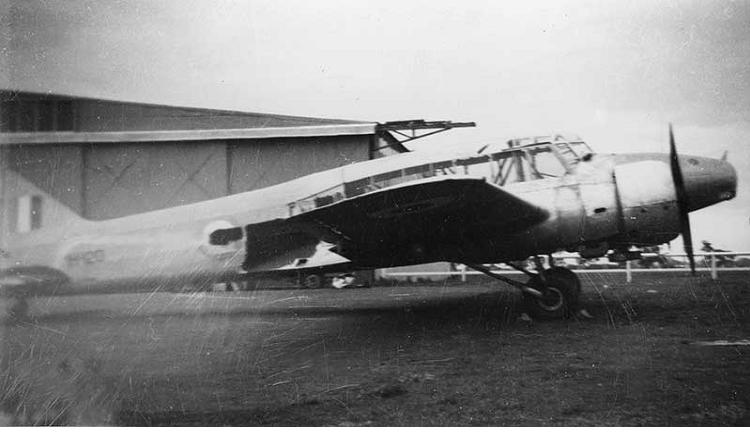
MH120
waiting for civil conversion, Moorabbin May
1957.
Photo by Neil Follett
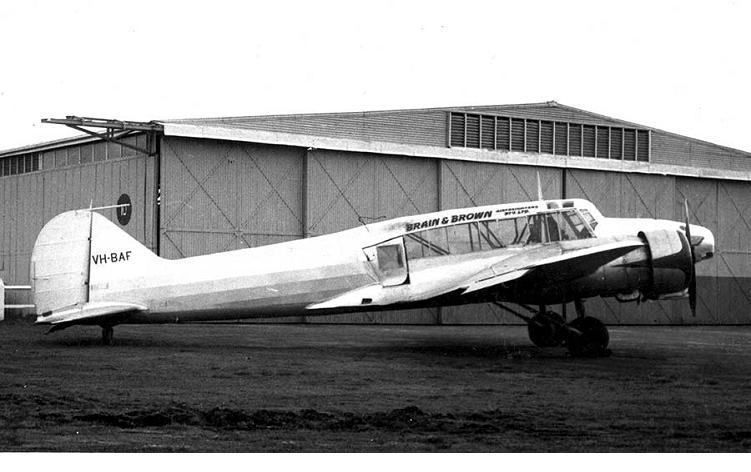
VH-BAF
at Moorabbin 1959 in Brain & Brown Airfreighters
markings.
Photo by Neil Follett
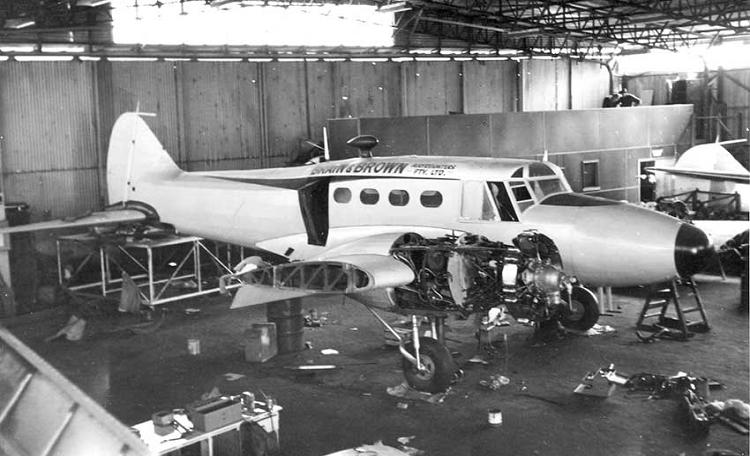 VH-BAF
under rebuild at Moorabbin in November 1962.
Photo by Dick Hourigan
VH-BAF
under rebuild at Moorabbin in November 1962.
Photo by Dick Hourigan
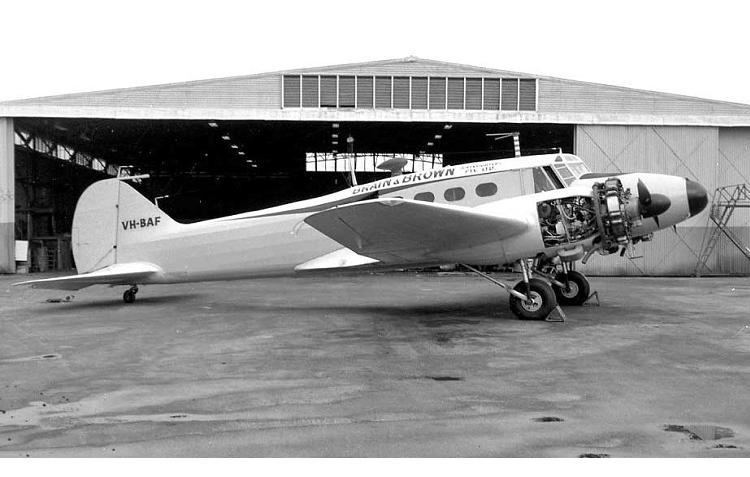
Completed
outside Brain & Brown’s hangar Moorabbin in
May
1963.
Photo by Geoff Goodall
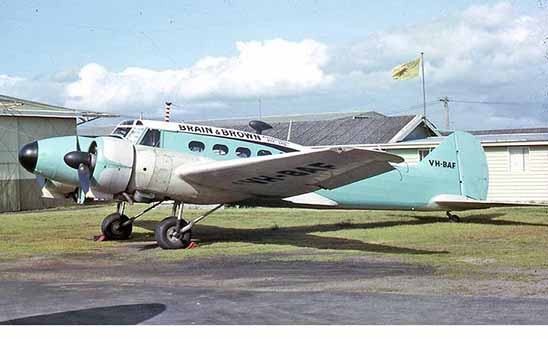
Moorabbin
in November
1963.
Photo by John Hopton
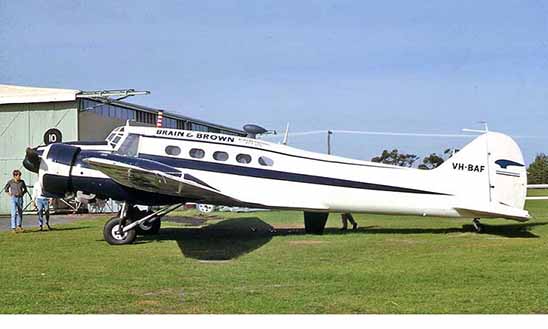
Moorabbin in April 1968, wearing a new paint
scheme.
Photo by John Hopton
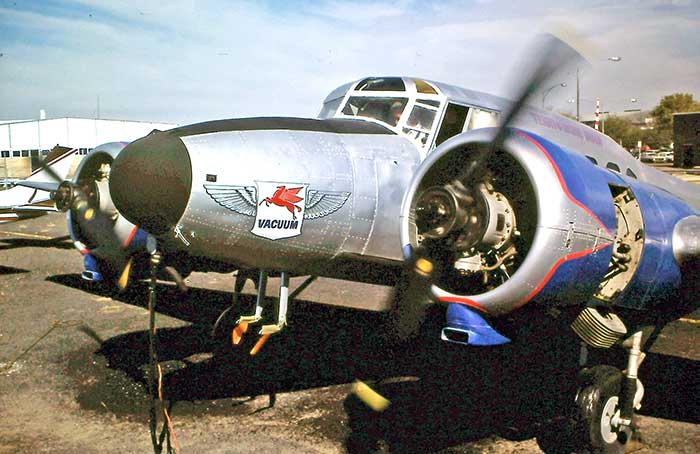
Terry
Brain in the left hand seat firing up VH-BAF's Cheetah engines at
Essendon in the 1970s.
Photo by Greg Thom
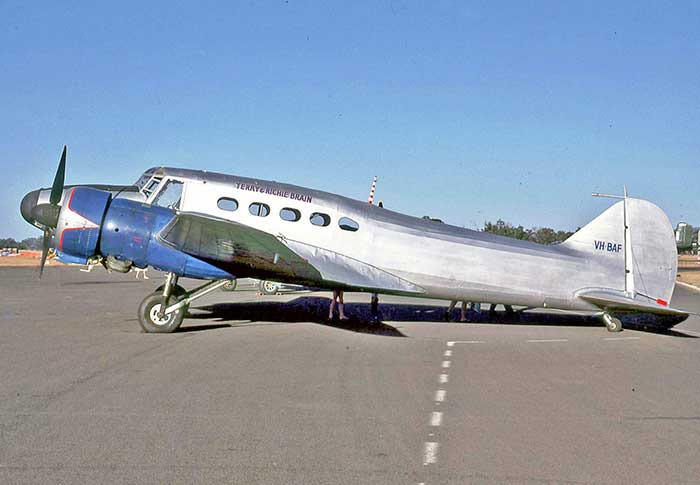
Visiting the April 1985 Mangalore Vic airshow in the final Australian paint scheme
"Terry and Richie Brain" above the windows. Photo by Geoff Goodall
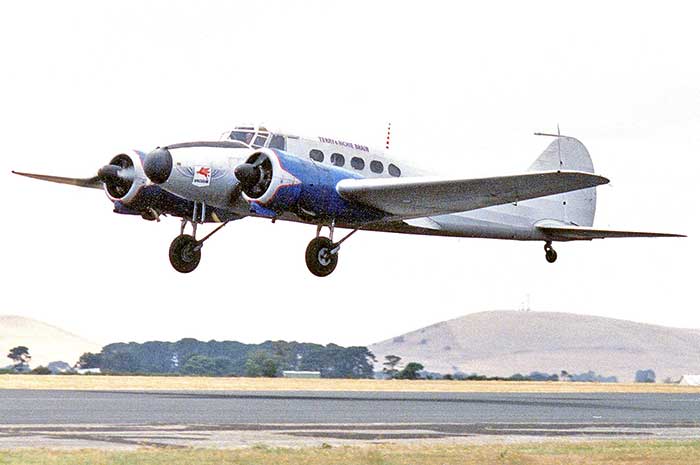
One of her final Australian flights in February 1987, at an airshow
at Ballarat Vic, Captain Terry Brain, copilot Russell Legg
Photo by Bob Livinghstone
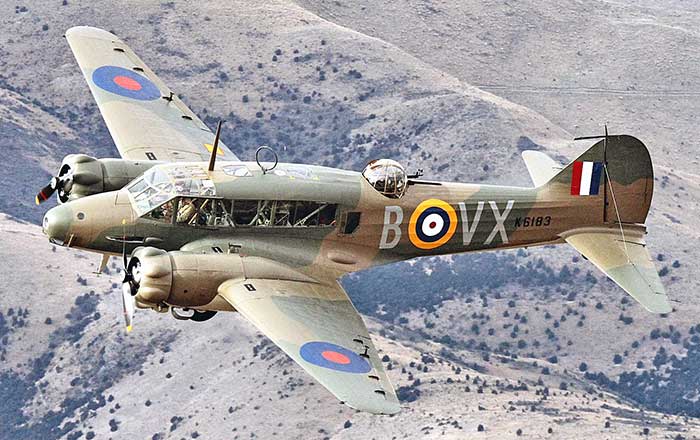
The Anson after its extensive NZ rebuild to WWII military configuration as ZK-RRA. Note the gun turret, the authentic cabin glasshouse, wartime "helmet" cowlings
DF loop on cabin roof and the early model sloping windscreen. Photographed at the 2014 Wanaka Air Show by Ian McDonell
6) CANADIAN ANSON 5 CF-HOT used for mineral survey in remote areas of South Australia and Western Australia 1957-1959, before returning to Canada. By happy coincidence, it was later to become the last airworthy Anson in Canada.
AVRO ANSON V CF-HOT
| .44 | Final assembly by MacDonald Bros Aircraft Ltd at Winnipeg, Manitoba as Anson Mk.V-P photographic model with long-range fuel tank. C/n BRC-1567. |
| The Anson V was designed in Canada as a wartime contingency to replace
metal aircraft components with wood structures. It used the original
Mk.1 Anson wing, tail and landing gear but a Vidal moulded
plywood fuselage. Increased power was provided by 450hp Pratt &
Whitney R-985 Wasp Junior radials. Airframe components were manufactured by eight contractor aviation companies and final assembly carried out by two: MacDonald Bros Aircraft Ltd at Winnipeg (also manufactured wings) and Canada Car and Foundry at Amhert, Nova Scotia (also manufactured fuselage fittings). The moulded fuselage was manufactured in five sections which were bolted together and sealed with fabric tape: cockpit, nose, and three monocoque fuselage sections, the rearmost had the vertical fin moulded into the unit. Canadian Government ordered a total of 2,800 Anson Mk.Vs for Royal Canadian Air Force under the British Commonwealth Air Training Plan, but the order was reduced to 1,069 aircraft as the war situation improved. |
|
| 21.9.44 | Taken on RCAF charge as a Mk.V-P as 12417 |
| 9.44 | Allotted to No.7 Photographic Wing |
| - | Allotted Central Experimental and Proving Establishment |
| 18.6.54 | Struck-off RCAF charge, issued to Canadian Crown Assets Disposal Corp |
| Sold to Field Aviation Co Ltd, Oshawa Ontario | |
| .56 | Registered CF-HOT Canadian Nickel Air Services Ltd, Copper Cliff, Ontario |
| .57 | Change of ownership: Commonwealth Geophysical Co Ltd, Copper Cliff, Ontario |
| 6.5.57 |
Australian Import Permit issued by Department of Civil Aviation to Commonwealth Geophysical Co for an Anson V |
| 8.5.57 | CF-HOT noted at Prestwick, Scotland while being ferried from Canada
to Australia by a crew from Fleetways. Also stopped at London-Croydon |
| 57-58 |
Operated in north west South Australia and in remote areas of Western Australia by a Canadian crew on magnetometer mineral survey for radium and other minerals |
| Maintenance carried out by Robby’s Aircraft Repair Co, Parafield Airport, Adelaide SA | |
| 1.59 | CF-HOT in Robby’s hangar at Parafield, appears retired, dust on airframe |
| 14.6.59 |
CF-HOT noted at Parafield, rudder and wing tips painted bright red |
| 13.7.59 |
Captain
D.R. Cairns, Chief Pilot of International Nickel, and navigator W.
Henderson, arrived in Adelaide from Canada to install navigation
equipment in CF-HOT prior to ferrying it back to Canada |
| 9.8.59 | CF-HOT arrived at London-Gatwick on ferry flight Parafield-Canada. Departed next day |
| 60s | Ownership reverted to International Nickel Company (INCO), Sudbury, Ontario |
| 26.9.71 | CF-HOT noted Ottawa, in service with INCO, red and blue with white trim |
| 6.79 | CF-HOT noted at Wallaston Post, Saskatchewan, in service with International Nickel Co (INCO), excellent condition, painted red and blue with white trim. It is the last Anson 5 still flying in Canada. |
| .80 | Donated by INCO to Canadian Warplane Heritage, Mount Hope Airport, Hamilton ONT. |
| .80 | INCO donated two Anson 5s to CWH: CF-HOT in airworthy condition, plus CF-IVK no longer operational. |
| 6.80 | flown into Hamilton ONT on delivery to CWH, red, blue and white IMCO scheme |
| 23.10.80 | Change of ownership: Canadian Warplane Heritage, Hamilton, Ontario |
| Restored by CWH in wartime British Commonwealth Air Training Plan all yellow as RCAF “12417” | |
| 1.8.81 | visited Oshkosh as yellow RCAF “12417” |
| Current. Maintained airworthy by CWH |
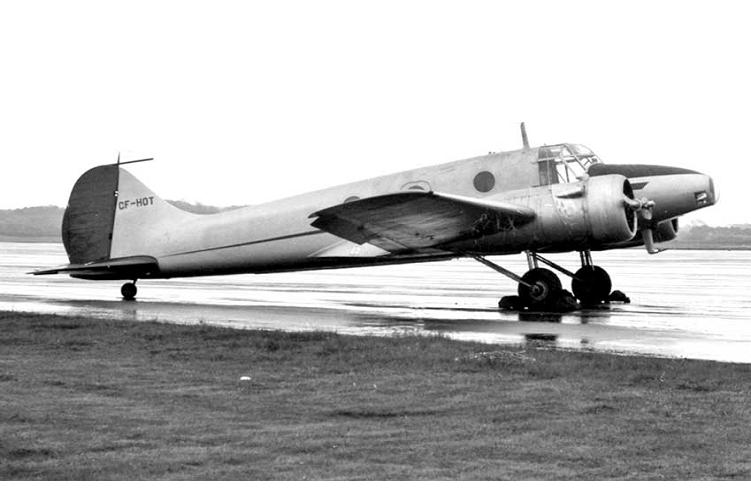
CF-HOT at Prestwick, Scotland 8 May 1957 on ferry flight to Australia. Dave Welch collection
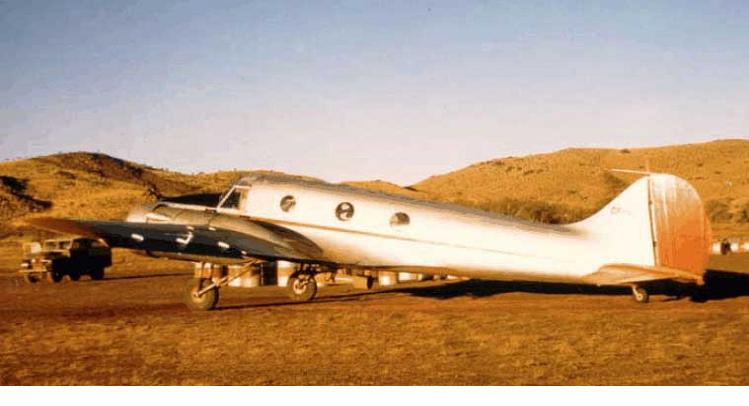
CF-HOT at a survey camp in outback WA in 1958. Photo via Doug Morrison
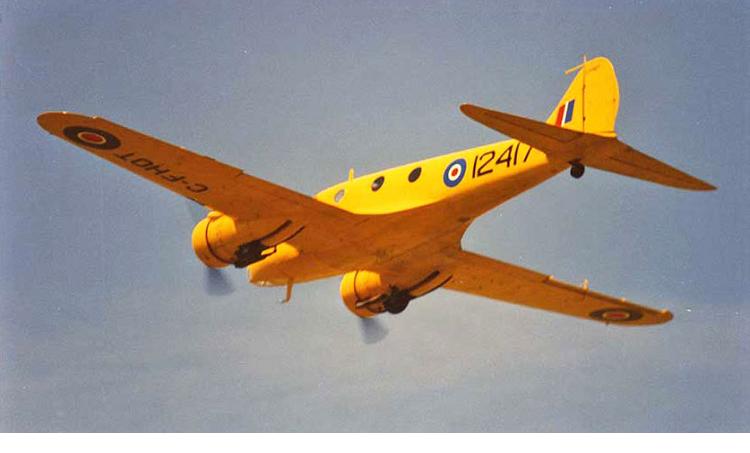
CF-HOT operated by Canadian Warplane Heritage. Geoff Goodall collection
Sources:
- Australian
Civil Aircraft Register, Department of Civil Aviation and its successors
- DCA Head Office file VH-BIX, 1957, Accession MP113/1, National Archives of Australia, Melbourne
- DCA WA Regional file VH-BIX, National Archives of Australia, Perth
- DCA file for modification of Anson VH-BAF to metal mainplane and tailplane, NAA Melbourne
- DCA Annual Survey of Aircraft Accidents, 1957 to 1961
- RAAF Status Cards (form E/E.88) NL153, VM374, VM375, MH120: RAAF Historical Section, Canberra
- RAAF Initial Notifications of Incident/Accident, file, RAAF Historical Section, Canberra
- National Library of Australia - Trove newspaper archive website
- Civil Aviation Authority, British Civil Register: g-info website
- Air Britain journals, various, 1957-1959: ferry flights of CF-HOT
- British Civil Aircraft Since 1919, A.J.Jackson, Putnam, Second Edition, 1973
- Avro Aircraft Since 1908, A.J.Jackson, Putnam, 1967
- Canadian Aircraft Since 1909, K.M.Molson & H.A.Taylor, Putnam, 1982
- British Independent Airlines since 1946, A.C.Merton-Jones, LAAS International, 1976
- The Anson File, compiled by Ray C Sturtivant, Air Britain, 1988
- British Military Aircraft Serials 1911-1979, Bruce Robertson, Patrick Stephens Ltd, 1979
- Taking Off, Pioneering small airlines of NZ, Richard Waugh, Craig printing, 2003
- AHSA Journal, monthly, 1961-1964
- South Australian Air Journal, monthly, Adelaide, 1963-1965: references to VH-RCC & CF-HOT
- Australian Air Log, monthly, Sydney & Adelaide 1965-1968: references to VH-RCC & VH-BAF
- The Anson File, R.C.Sturtivant, Air Britain (Historians) Ltd, 1988
- Aviation News, periodical 8 November 1980: INCO donation of Anson 5s to CWH
- Aviation News, periodical 25 August 1983: R.C. Sturtivant, service record PH599
- Balus The Aeroplane in Papua New Guinea, Vol.1, James Sinclair, Robert Brown & Assoc 1986
- Plane Chocolate, The story of the MacRobertson Air Race, Australian National Aviation Museum 2009
- Southern Airlines, Roger McDonald, Aviation Heritage, Aviation Historical Society of Australia
- The Federal Aircraft Anson V, Paddy Gardiner, Journal of Canadian Aviation Historical Society, Winter 2014
- Terry Brain, interview with the compiler, Melbourne, October 1982
- Sir Reginald Barnewall, Bart: correspondence with Roger McDonald
- Gus Greenfield, interviewed by Trevor Boughton, June 1982
- Doug Morrison, Sydney: research on aerial survey by VM374 & VM375
- Alistair Coutts, Perth: notes on sightings of remains of VH-BIX at Maylands 1963
- Russell Legg, Darwin: notes and pilot log book extracts for VH-BAF
- Classic Wings magazine, NZ quarterly: 2004 onwards, reports on VH-BAF restoration
- She Chose Us, Bill Reid, Flypast magazine, October 2012; VH-BAF restoration
- Letter Air Culture to Brain & Brown Airfreighters 20.1.61, courtesy Russell Legg